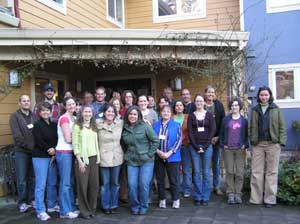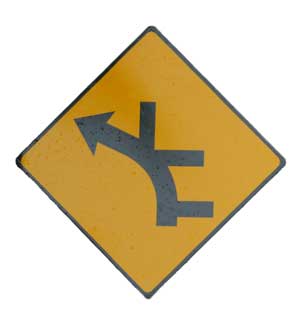
(Note: Short on time today, so I’m posting a slightly revised version of a post I did about 8 months ago. I still think it’s relevant, so hope you enjoy it!)
There are a ton of tips out there for making green and responsible choices — choose compact fluorescents, drive less, buy organic and fair-trade, use cloth bags, etc. These are all terrific, simple things that most of us can do; but, it’s also important for us to examine the bigger picture — to have a vision and connection and purpose in helping create the world we want for all. Here are 15 tips for cultivating a more humane life:
- Seek out inspiration, knowledge and support. Read, view and explore widely and deeply. Find role models whose bits of wisdom resonate with you. Find inspiring and meaningful quotes, visuals and other tidbits. Surround yourself with empowering and supportive people. The humane journey can feel lonely, but there are a lot of people out there working for a humane world; we need to connect with and learn from each other.
- Go plant-based, local, organic, unprocessed, seasonal, fair trade as much as you can. Our daily food choices have such an enormous impact on ourselves, other people, animals and the earth that they deserve special consideration.
- Build community in your neighborhood. This could mean something as complex as developing and living in a co-housing community, or something as simple as getting to know your neighbors, holding a neighborhood potluck, or sharing tools and other resources. We love and respect what we know. When we know each other, we have a better chance of treating each other with kindness and respect and of being more concerned about the impacts of our actions on others.
- Love your “enemy”. Finding compassion for those whose actions we abhor is one of the most challenging tasks we can ask of ourselves. But it is so essential to explore others’ points of view, and to develop tolerance and understanding for those who don’t share our views. We are all more than just the pieces of ourselves. Learn to find and love the positive pieces of others.
- Learn skills for communicating compassionately. We can’t build a humane community if we can’t listen, and if we’re making judgments and assumptions about others. Cooperate. Build bridges. Communicate to understand and connect, rather than to convince.
- Teach others & share the joys and power of what you’ve discovered, without proselytizing. If you can show people that they can live humanely while still meeting all their needs and finding happiness and fulfillment, you have the potential to influence their future choices and the lenses through which they view the world.
- Extend your circle of compassion to all beings and the earth. See non-human animals not just as biodiverse species to be respected, but as individual beings, each deserving respect and equal consideration. Immerse yourself in the natural world so that your reverence and respect can grow and flourish.
- Reduce your footprint. We can make conscious and careful choices and still have a huge ecological footprint. Hybrid cars, giant eco-houses and green travel to faraway countries are all greener ways of living, but they all still have a significant impact on the earth. Find ways to reduce your impact and live a meaningful, joyful life.
- Pay attention to the influence of media and advertising. A lot of our need for stuff comes from people telling us we’re not healthy-whole-sexy-successful-worthy-intelligent-interesting-normal unless we buy a bunch of products or choose a certain lifestyle. Make your choices with awareness and intention, rather than because you’re feeling inadequate or fearful or lonely or bored, and learn to know when someone is trying to manipulate you.
- Expand your global awareness and connection. Make room for everyone. We North Americans pat ourselves on the back for our eco-friendly choices, but we still consume the earth at an alarming rate, leaving much less for our brothers and sisters around the world. We also need to be aware of the choices our corporations and governments make in regard to other countries, and to speak out when those choices are poor ones.
- Examine your lenses. As activist Laura Moretti says, “That’s the nice thing about beliefs. Just because you’ve put your faith in them doesn’t make them true.” Learn to view the world through a humane lens: see the impact of your choices, the influence of your words and interactions with others, the example you set for children. Ask yourself if the choices you make every day (and the influences of those choices) reflect the kind of world you want for yourself and for future generations.
- Do some small something every day to make the world a better place. Celebrate the small victories and habits.
- Pause every day to count your blessings. Remember the journeys of your neighbors, especially those around the world who have much less. If we pause to reflect on all that we have and to feel gratitude for that, we’re much less likely to feel deprived and thus feel the desire to have more.
- Exercise your own power and responsibility. It’s not up to the government or scientists or industry or technology to fix things. We each need to step up and create the world we want. We can recognize the power each of us has — in our daily choices and in supporting (or refusing to support) certain systems — and use that power wisely.
- Expand your creativity. There are so many ways to solve problems and to fulfill our needs without depriving or destroying others. Take advantage of your creativity to explore them. Look for “third side” and “both/and” solutions that benefit all.
~ Marsha
Filed under: MOGO Habits | Tagged: green living, humane living, integrity, intentions, interconnectedness, MOGO choices, Most Good, principles, values | 1 Comment »






 A
A  My 4th grade teacher, Mrs. Leddy, had us students do something that I have never forgotten. She called it a “car wash.” Every week one of us would be the “car,” and the other students would form two lines in front of the car. One by one, zigzagging from one side to the other, the car would go to each person in the “wash” line, and that person would whisper into the “car’s” ear something good about them — something that the speaker liked, respected, appreciated or admired about them. I don’t remember many of the things my fellow students said to me. I remember one guy said that I was his third girlfriend (whatever that meant). I remember that the boy I had a crush on told me that he liked playing sports with me (I was a major “tom-boy”…and still am.) Someone else liked my smile. Someone else said that she noticed that I tried to be nice to everyone. The details of those individual encounters is fuzzy, but the memory of how I felt after having been washed in all that good will and kindness is still precious to me.
My 4th grade teacher, Mrs. Leddy, had us students do something that I have never forgotten. She called it a “car wash.” Every week one of us would be the “car,” and the other students would form two lines in front of the car. One by one, zigzagging from one side to the other, the car would go to each person in the “wash” line, and that person would whisper into the “car’s” ear something good about them — something that the speaker liked, respected, appreciated or admired about them. I don’t remember many of the things my fellow students said to me. I remember one guy said that I was his third girlfriend (whatever that meant). I remember that the boy I had a crush on told me that he liked playing sports with me (I was a major “tom-boy”…and still am.) Someone else liked my smile. Someone else said that she noticed that I tried to be nice to everyone. The details of those individual encounters is fuzzy, but the memory of how I felt after having been washed in all that good will and kindness is still precious to me. We live in what appears – on the surface – to be a dichotomous society: black or white, masculine or feminine, paper or plastic, organic or conventional, animals or people, jobs or environment, us or them, and so on in an infinite number of either/ors and exclusions of something or other. But in reality, we often have a much broader set of choices. There is almost always a third choice. Or a fourth. Or fifth.
We live in what appears – on the surface – to be a dichotomous society: black or white, masculine or feminine, paper or plastic, organic or conventional, animals or people, jobs or environment, us or them, and so on in an infinite number of either/ors and exclusions of something or other. But in reality, we often have a much broader set of choices. There is almost always a third choice. Or a fourth. Or fifth. Be sure to schedule these into your iPhone, Blackberry, calendar, piece of scratch paper, or whatever you use to keep track of can’t-miss events:
Be sure to schedule these into your iPhone, Blackberry, calendar, piece of scratch paper, or whatever you use to keep track of can’t-miss events: Most of us want a world full of love, joy, peace, kindness, compassion, justice and respect for all. But often our daily choices don’t reflect our longing for such a world. It’s too easy to give into the mainstream mindset of violence, consumption, fear, greed and competition, rather than making choices that nurture and support a humane world. But when we take time to stop think about what our deepest values really are, and compare them with the impact of our daily habits, we can better assess whether our life is really our message.
Most of us want a world full of love, joy, peace, kindness, compassion, justice and respect for all. But often our daily choices don’t reflect our longing for such a world. It’s too easy to give into the mainstream mindset of violence, consumption, fear, greed and competition, rather than making choices that nurture and support a humane world. But when we take time to stop think about what our deepest values really are, and compare them with the impact of our daily habits, we can better assess whether our life is really our message.